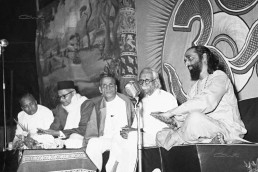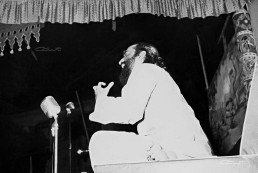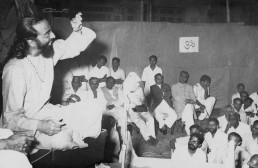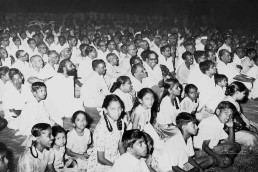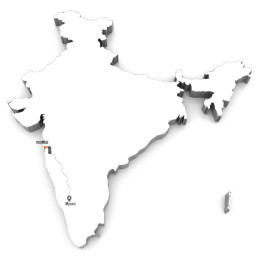
Jnana Yajna 77

Year & Dates:
December 04, 1960 to December 29, 1960

Yajna Topic:
Shrimad Bhagavad Gita- Chapter 2

Place:
Mumbai (Bombay), India.
Seeing an airport lounge overflow with a huge crowd of enthusiastic devotees rushing to welcome Pujya Gurudev when He landed in any airport was a common occurrence. The story was the same in railway stations too. Pujya Gurudev began gently discouraging such gatherings; thus, when He landed on December 3, 1960, in Mumbai, only a small group of yajna committee members, Chinmaya Mission office-bearers, and a few devotees, happy to have His permission, welcomed Him. After a caring word for each one, He shifted His attention to the preparations for the 77th Jnana Yajna in Mumbai.
The Yajnashala: The venue for the Gita Jnana Yajna was the sprawling Indian Gymkhana Grounds near Matunga, Mumbai, with a Purna Kumbha welcome after a joyful procession from Napoo Gardens.
The Inauguration: It was the honor given to Prof. D. D. Vadekar, Poona University on the evening of December 4, 1960.
Increasing Yajnas, Mindful Modifications
From the Inaugural Message: A longtime admirer of Pujya Gurudev, the academically eminent Prof. Vadekar said that the Gita was the gospel of life and the distilled essence of the spiritual literature of India.
The Chief Guest: Known for his great contribution to Yoga, Swami Kuvalayananda of Kaivalyadham, Mumbai, who was close to 80 years old, admired Pujya Gurudev for His tireless service in bring Srimad Bhagavad Gita to the forefront of modern minds. Calling Pujya Gurudev as a spiritually advanced Guru , Swami Kuvalayananda noted, “Swami Chinmayananda, for all his black hair, is older!”
From Pujya Gurudev’s Inaugural address: Thanking both the professor and the yogi for their assurance about the grandeur of the Gita, Pujya Gurudev began, “I am here to represent the man on the street. We have all heard that the Gita is a great book, a scripture…contains wonderful advice, gives an ideal to pursue, a goal in life to live etc. Can Gita give us strength to bear nobly our Cross? Can it give us the courage to suffer our bitterness, agitations, despairs, despondencies? If a study of Gita can help us even a little in these, certainly we will start its study right away.
“Our text for the current Yajna is chapter 2. In short, it is the ‘index’ for the Gita, and I assure you that there will be a lot of real-drama in it!”
The Audience: They had listened the previous year to Bhagavad Gita chapter 3 from Pujya Gurudev, where He extolled the glory of action through Karma Yoga. In the pleasant Mumbai winter, thousands of Mumbai seekers filled the Gymkhana grounds, not wanting to miss the transcendent knowledge that Bhagavan Krishna was transmitting through Pujya Gurudev.
For Reflection: As 1960 came to an end, Pujya Gurudev slowly declutched the features of the yatras, havana, or laksharchana from His further yagnas. It was not that He considered such modes of Sadhana as no longer required. The groups were getting bigger, and Pujya Gurudev had delegated, with clear guidelines, such yatras and activities to the different Chinmaya Mission centers.
Meanwhile, Sandeepany Sadhanalaya in Mumbai was taking shape, and Pujya Gurudev devoted time to nourish its roots while carefully managing the demands of His increasing Jnana Yajnas.
Photo Gallery
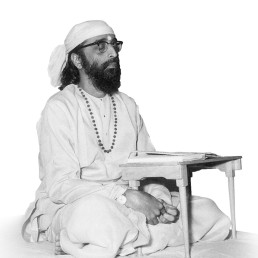
“Think,” Says Pujya Gurudev
The Philosophy of a country like India in the Vedic period, may necessarily be Theistic, but it has its applications in all walks of life. If it fails in its all-round application, it cannot be a philosophy. A theory of life which has no universal application can only be appreciated as a noble opinion of an individual which may have its own limited application, but it can never be accepted as a philosophy.
In the entire scheme of Bhagawan’s arguments so far he has provided Arjuna with all the necessary arguments which a healthy intellect should discover for itself, before it can come to a reliable and dependable judgment upon the outer happenings. A mere spiritual consideration is not the last word in evaluating the material situations. Every challenge is to be estimated from the spiritual stand-point, from the intellectual stand-point or reason, from the emotional level of ethics and morality, and from the physical level of tradition and custom. If all these considerations without any contradiction in themselves indicated a solitary truth, that is surely then the Divine Path of judgment that one should at all costs take up.
From Tyagi Magazine
What causes Anger?
Failure to control the senses leads to a downward spiral: attachment to desires, followed by disappointment and anger. Anger clouds judgment, leading to delusion and forgetfulness of rationality, turning one into a mere creature driven by instincts, devoid of discernment.
